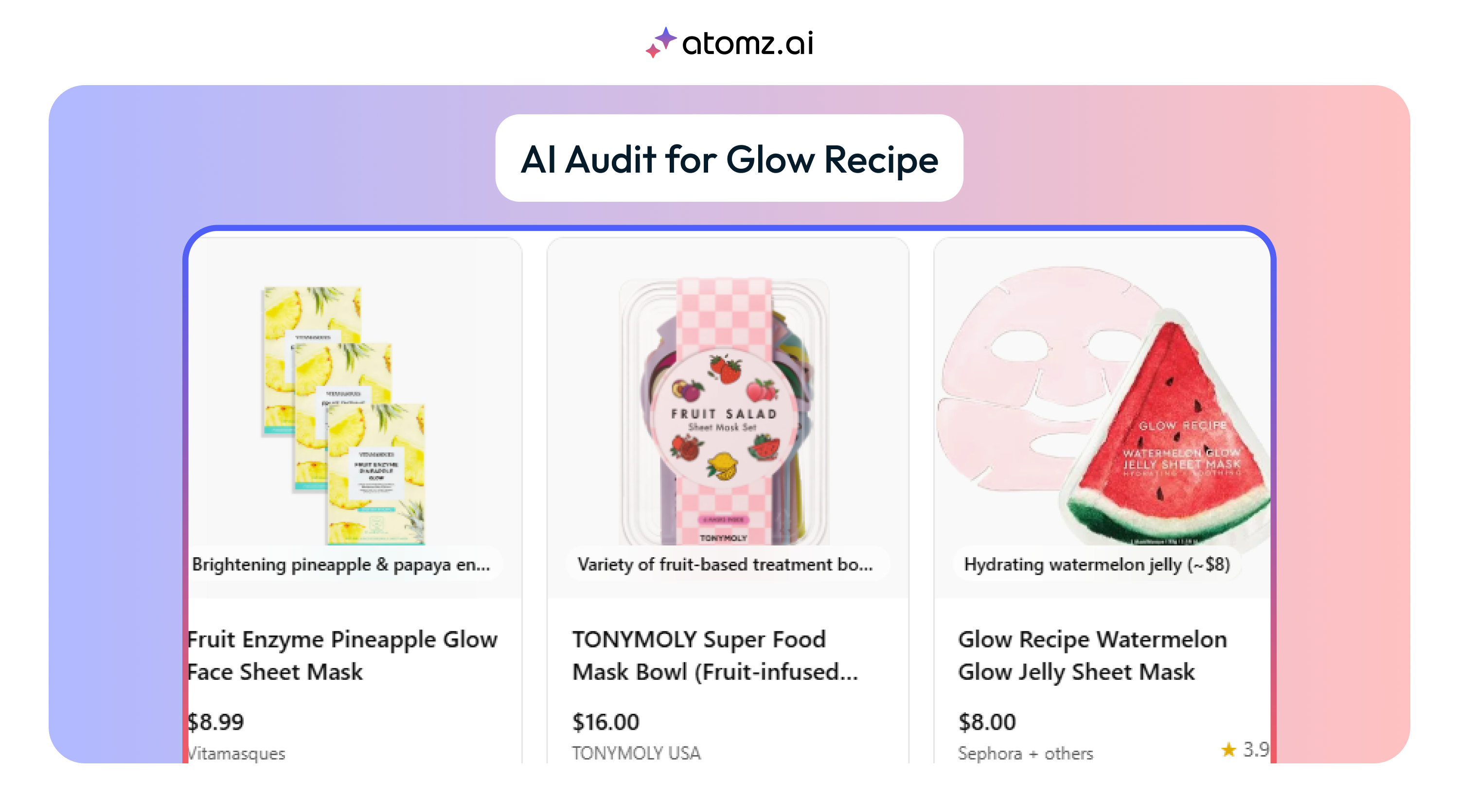
ON THIS PAGE
Stay Updated with latest in AI SEO
04 December 2025
I've been tracking an interesting trend: as beauty shoppers increasingly turn to ChatGPT for product recommendations, the brands that dominate aren't always the ones you'd expect. Traditional marketing reach doesn't translate directly to AI visibility.
This week, I analyzed Glow Recipe - the K-beauty brand that built a cult following around watermelon, blueberry, and other fruit-infused formulations. With their playful aesthetic and fruit-forward positioning, they've carved out a distinctive niche in the crowded skincare market.
Glow Recipe appeared in 4 out of 13 purchase scenarios I tested. Interestingly, they dominated fruit-specific searches but were invisible in broader K-beauty and skincare categories where you'd expect them to shine.
Before diving into the Glow Recipe results, you can check your brand's general AI readiness right now.
Test Your Brand's AI Visibility →
Takes 2 minutes. See how your brand performs across different AI systems.
Test how your brand performs across the complete AI discovery spectrum with these 13 strategic queries:
1. Category Authority (2 queries)
Tests: Do you own your product category in AI recommendations?
2. Ingredient Specificity (4 queries)
Tests: Does AI recommend you for your signature ingredients?
3. Benefit-Focused (3 queries)
Tests: Do you appear when customers describe desired outcomes?
4. Competitive Positioning (2 queries)
Tests: How do you perform against established brands?
5. Product Discovery (2 queries)
Tests: Do you surface in product exploration searches?
Scoring Your Results:
4 out of 13 queries (31% visibility)
Scoring approach: 8+ mentions = strong visibility | 4-7 = mixed results | under 4 = limited visibility
Here's what happened with each search:
Result:
Missing entirely
What appeared instead:
Anua 5-Step Korean Skincare Bundle ($88.00), Sulwhasoo First Care Trial Kit ($60.00), Beauty of Joseon Skincare Routine Set ($61.00)
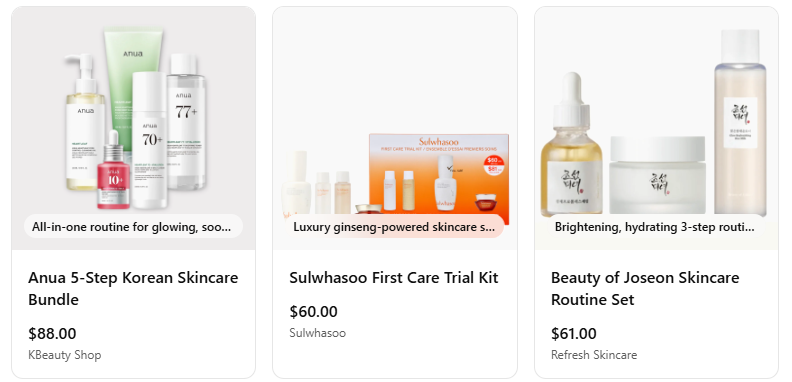
My take:
Despite K-beauty origins, Glow Recipe doesn't appear in Korean skincare searches - traditional K-beauty brands dominate instead.
Result:
Missing entirely
What appeared:
OSEA Bestsellers Discovery Set ($48.00), Lyonsleaf Natural Skincare Solution 03 Set ($26.00), Hello Joyous Ultimate Skincare Bundle ($186.00)
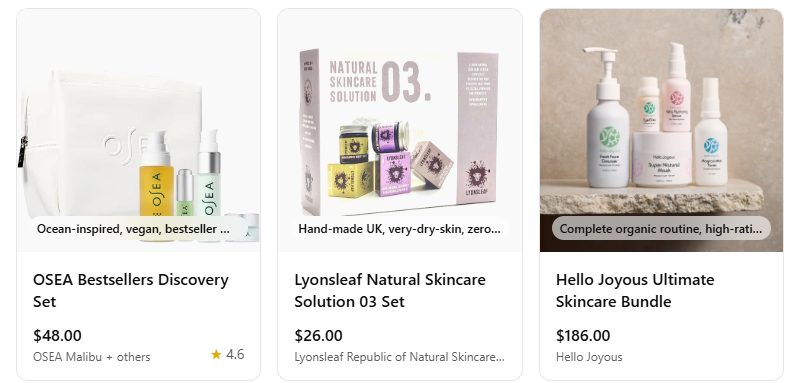
My take:
Natural skincare searches favor brands positioned around "clean" and "organic" rather than fruit-forward formulations.
Result:
Featured prominently
What appeared:
Fruit Enzyme Pineapple Glow Face Sheet Mask ($8.99), TONYMOLY Super Food Mask Bowl ($16.00), Glow Recipe Watermelon Glow Jelly Sheet Mask ($8.00)
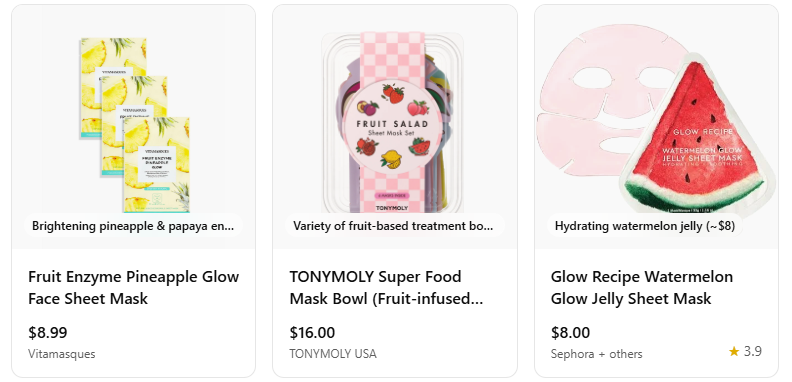
My take:
Strong performance in fruit-specific searches, positioned alongside other fruit-focused skincare brands.
Result:
Featured twice
What appeared:
Glow Recipe Blueberry Bounce Gentle Cleanser ($10.00), Glow Recipe Watermelon Glow Pink Juice Moisturizer ($21.00), Milk Makeup Watermelon Jelly Brightening Serum ($29.00)
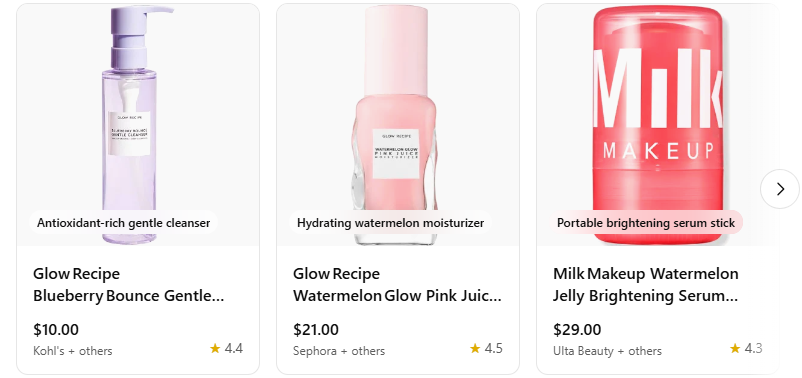
My take:
Excellent visibility when searches specifically mention fruit ingredients - their core positioning strength.
Result:
Dominated completely
What appeared:
Glow Recipe Watermelon Glow AHA Night Treatment ($40.00), Glow Recipe Watermelon Glow Niacinamide Dew Drops ($20.00), Glow Recipe Watermelon Glow Pink Juice Moisturizer ($40.00)
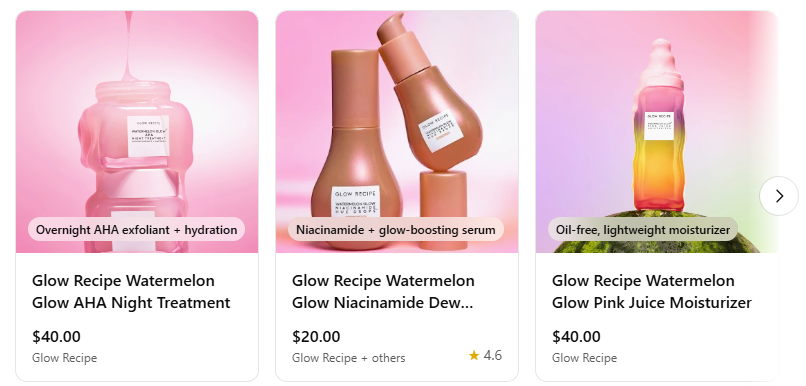
My take:
Total dominance in watermelon-specific searches, appearing in all three top results with different products.
Result:
Missing entirely
What appeared:
Plant-based Fruit-Infused Brightening C Serum ($24.00), Goodness "Be Bright" Vitamin C Face Serum ($12.00)
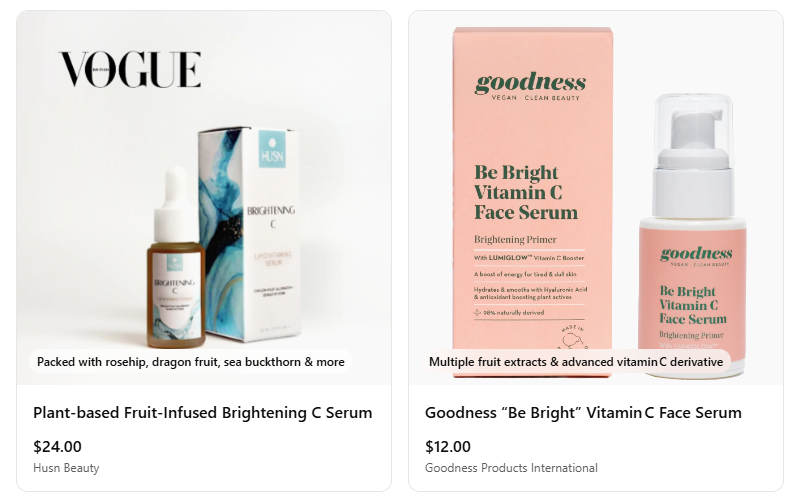
My take:
Vitamin C searches favor clinical and budget-focused brands over fruit-positioned products.
Result:
Missing entirely
What appeared:
Vasanti Brighten-Up Glow-Boosting Serum ($39.00), HEJ ORGANIC Naked Glow-Boosting Face Serum ($18.00), BOOST LAB Vitamin C Brightening Serum ($22.99)
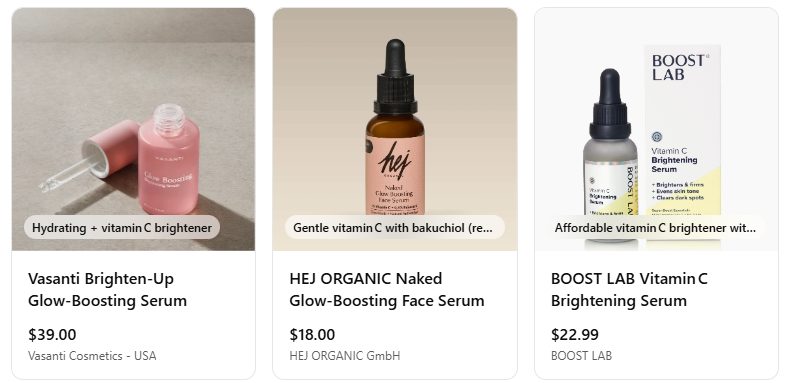
My take:
"Glow" searches favor clinical vitamin C serums over fruit-based glow products, despite Glow Recipe's name.
Result:
Missing entirely
What appeared:
Mad Hippie Hydrating Routine for Dry Skin ($105.56), Pure Lanolin – Natural Moisturizer ($15.99), UpCircle Coffee Face Scrub ($24.00)
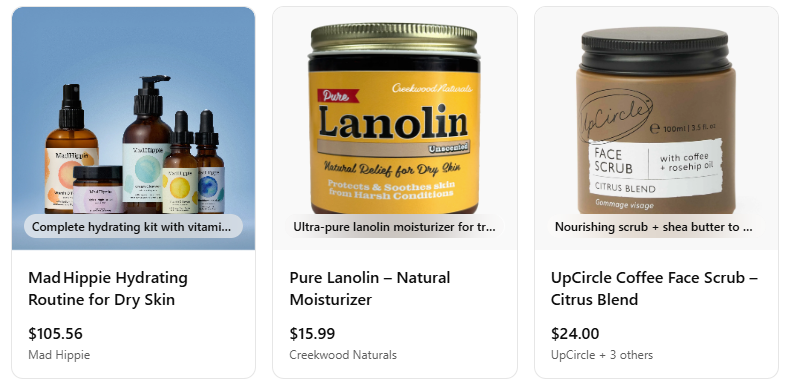
My take:
Dry skin searches prioritize hydrating and barrier-repair brands over fruit-forward formulations.
Result:
Featured prominently
What appeared:
Glow Recipe Plum Plump Hyaluronic Serum ($38.00), Fenty Beauty Dew N Plump Hydrating Nectar Glow Serum ($38.00), Bliss World Glow & Hydrate Day Hyaluronic Serum ($24.00)
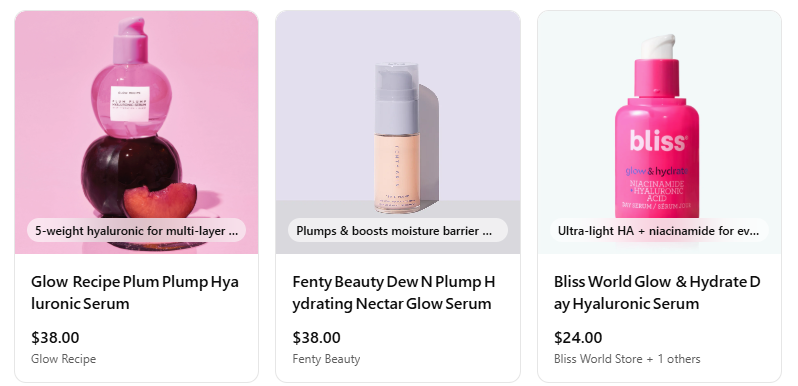
My take:
Strong performance when "glow" and "hydration" are combined, aligning perfectly with their plump + glow positioning.
Result:
Missing entirely
What appeared:
Comprehensive list including COSRX, Beauty of Joseon, Laneige, Sulwhasoo, Innisfree, Dr. Jart+, SKIN1004, Anua, Round Lab, Banila Co - but no Glow Recipe
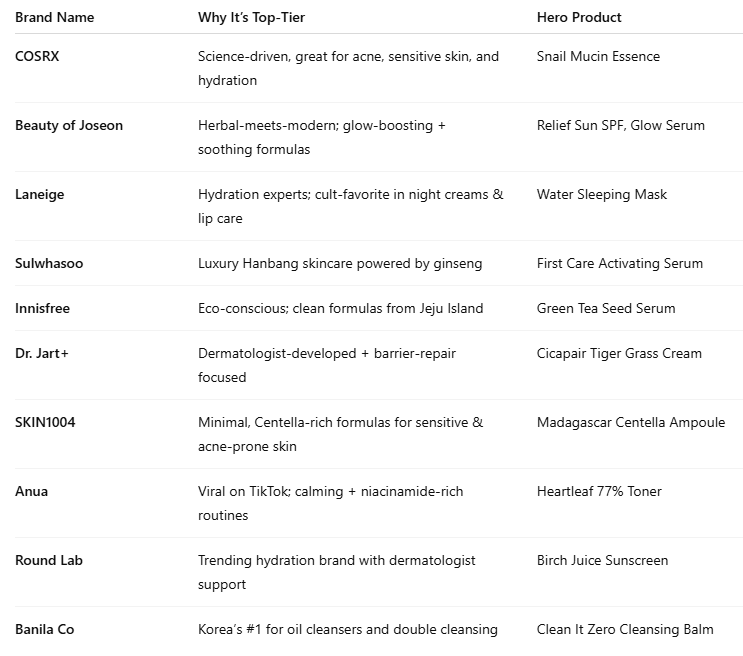
My take:
Despite K-beauty origins, Glow Recipe isn't associated with traditional K-beauty brands in AI categorization.
Result:
Missing entirely
What appeared:
Detailed list including The Inkey List, Revolution Skincare, Naturium, CeraVe, KraveBeauty, Purito, Dear Klairs, Tropic Skincare, Dr. Hauschka, Curel - but no Glow Recipe
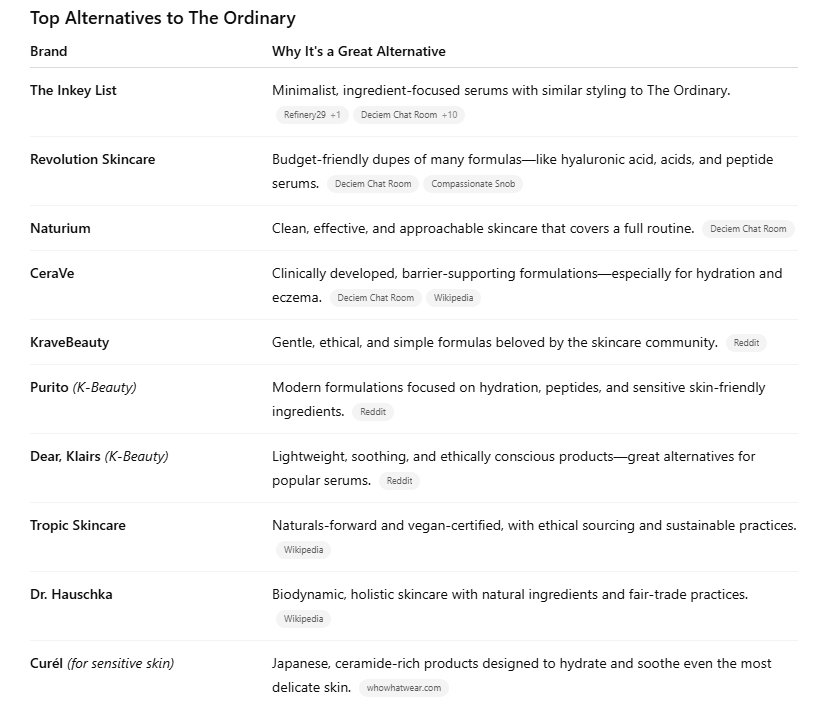
My take:
The Ordinary alternatives focus on clinical, minimalist brands rather than fruit-forward, sensorial products.
Result:
Missing entirely
What appeared:
Inlight Beauty Discovery Sample Set ($18.00), Nyrah Beauty Trial Pack ($36.00), Esteli Skincare Sample Set ($12.00)
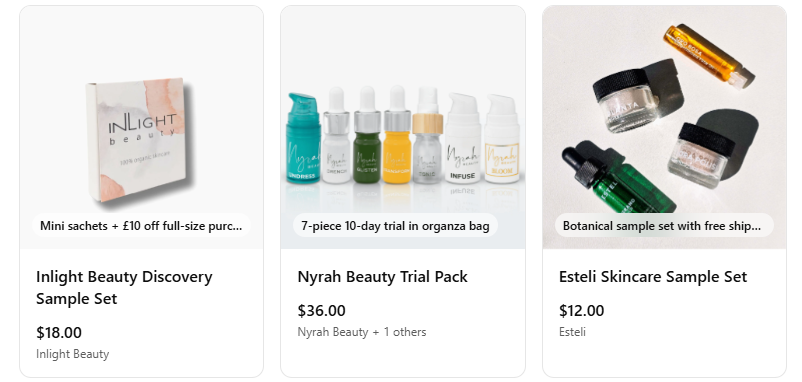
My take: Sample-focused searches favor smaller, discovery-oriented brands over established fruit skincare companies.
Result:
Missing entirely
What appeared:
Perfect Sensitive Skin Set ($146.00), Starter Set Sensitive ($58.00), Hypoallergenic Facial Skincare Kit ($71.00)
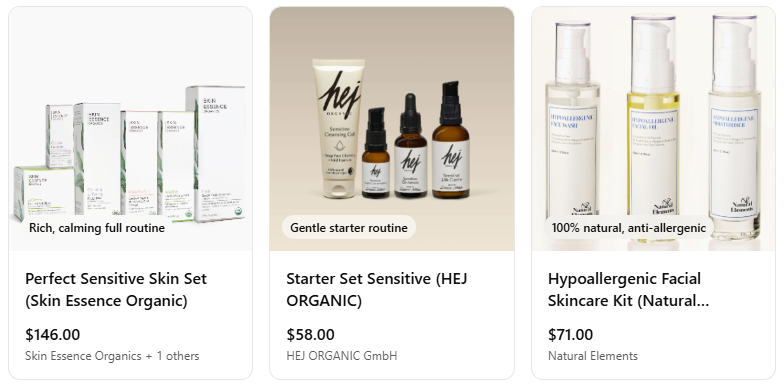
My take:
Sensitive skin searches prioritize hypoallergenic and organic certification over fruit-based formulations.
The standout finding: Glow Recipe completely dominated watermelon-specific searches (appearing in all 3 results) and performed well in fruit-related queries, but was invisible in broader K-beauty, natural skincare, and competitive positioning searches.
Why this might be happening: Glow Recipe's fruit-forward positioning creates strong associations with specific ingredients but may limit discovery in broader skincare categories. Their K-beauty origins don't translate to AI categorization with traditional Korean brands.
Working theory: AI systems strongly associate Glow Recipe with fruit ingredients rather than broader skincare benefits or K-beauty heritage, creating both advantages in niche searches and limitations in category discovery.
The ingredient specialization effect: Glow Recipe excels when searches specifically mention their signature ingredients (watermelon, fruit) but struggles when searches focus on broader benefits (hydration, glow) or category positioning (K-beauty, natural).
Category performance breakdown:
The fruit association factor: Glow Recipe's strong ingredient positioning creates powerful associations with watermelon and fruit searches but may limit discovery in broader skincare and beauty categories.
Seeing similar patterns in your industry? Don't guess about your AI visibility.
Check Your Brand's AI Readiness →
See how your brand performs across multiple AI systems. Then manually test the 13-query framework above.
For specialized brands: Strong ingredient positioning can create powerful niche discovery but may limit broader category visibility. You need structured product data that connects specific ingredients to broader skincare benefits.
For heritage brands: Geographic or cultural positioning (K-beauty) doesn't automatically translate to AI categorization with traditional brands from that category.
The benefit balance: Brands focused on unique ingredients need to also optimize for benefit-driven searches where customers may not know specific ingredient preferences.
Learn more about optimizing beauty brands for AI discovery in our guide: Prompt-Optimized Product Descriptions
Check your brand's baseline AI visibility. Start here →
Which categories are you missing from? Where do competitors appear instead of you?
Optimize your product information for AI systems. Check our LLM Audit Checklist for specific optimization steps.
Re-run tests monthly to track improvement and catch new patterns.
Based on this research, I've built several tools to help brands optimize for AI discovery:
• AI Readiness Scanner → Test your brand across multiple AI systems
• LLMs.txt Generator → Help AI systems understand your products
• Catalog Genius → Structure product data for better discovery
• AI Search Demo → See intelligent product discovery in action
Want your brand tested?
I'm building a research database of how brands appear in AI discovery systems.
Suggest a brand for analysis →
Testing method:
Fresh ChatGPT-4 sessions, purchase-intent queries, conducted August 7, 2025. This analysis examines publicly available AI responses for research purposes.
Study limitations:
Single AI platform (ChatGPT-4), point-in-time snapshot, purchase-intent queries only. Results may vary across different AI systems and time periods.
Tools used: AI readiness scanner, LLMs.txt generator, and catalog optimization agent for analyzing brand discoverability patterns.
© 2025 AI Brand Intelligence by Atomz. Forward freely, just keep this notice intact.
Streamline your workflow, achieve more
Richard Thomas
Create buying intent instantly
Create buying intent before customers search. 25%+ conversion lift guaranteed.
Why Prompts Matter
AI Search That Converts 3x Better
Get the latest in AI-powered search, UX trends, and eCommerce conversions—straight to your inbo
No spam. Just powerful insights.
👉 Join thousands of growth-focused brands.

